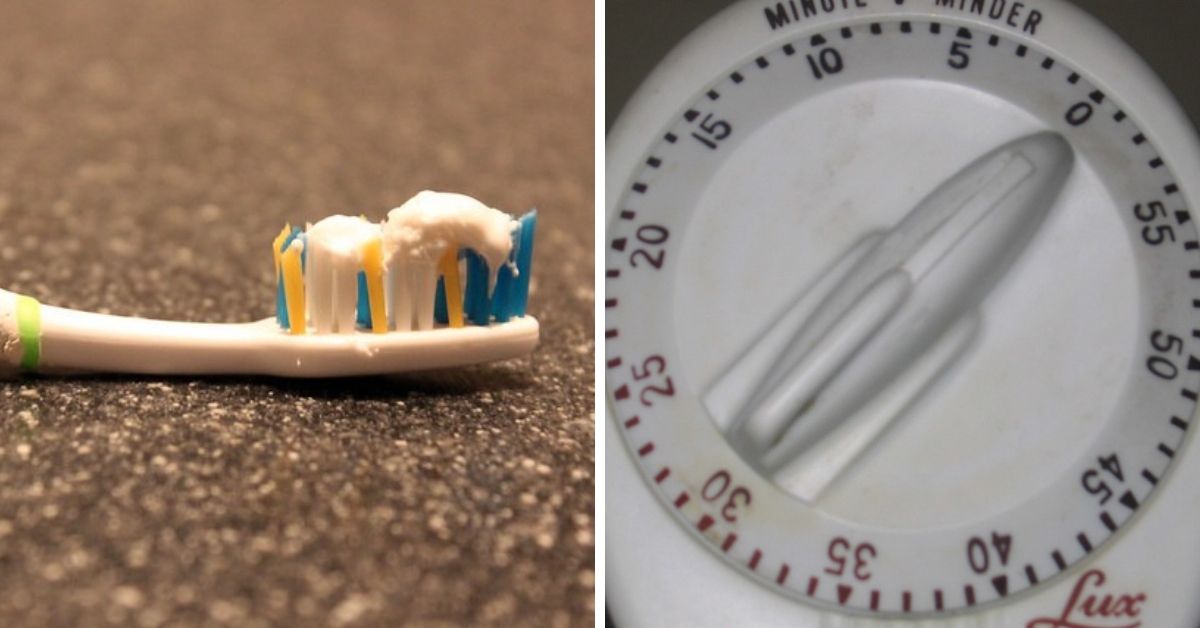Brushing your teeth is easy, right? We've been doing it since we were kids, and there's really no trick to it. Or at least that's what we thought. It turns out, there are some things we're all doing that could be affecting the effectiveness of our brushing, and in the long run that could come back to bite us (pun only slightly intended).
Take a look at some of the most common brushing mistakes and see if you're committing any of them!
1. Too Much Pressure
The harder you brush, the better it is, right? Wrong. According to Matt Messina, a dentist from Ohio, brushing your teeth too hard doesn't really accomplish anything.
"I think one of the biggest issues that people have is that they try to scrub their teeth too hard. They feel like if they really don't go at the teeth, like they're trying to clean the grout in their bathroom tile, that they're not doing the right job," says Messina. "The best way to fix this is to take away the mental issue of "˜scrub' and "˜scrub brush' and replace it with the word "˜massage.'"
2. You Don't Replace Your Brush
If the only time you're replacing your toothbrush is when you go see the dentist, then you're certainly not replacing it as frequently as you should be. Sure, you might love the way it works or how it feels, but after three months, you should be heading to the store to get a new toothbrush.
Of course, if your bristles are frayed, the color has changed, or the brush looks in any way dirty, you should be replacing it far before three months.
3. Wrong Tooth Brush
There are so many toothbrush options at the store, it's easy to get overwhelmed and just pick whichever is cheaper. However, dentist Kimberly Harms says that you should be looking at a myriad of things, such as length of the bristles, size of the head, and how it reaches your gums. Whether it's manual or electric, that's really up to you, but Harms says there's one thing you must have.
"The one thing that we really insist upon -- it's very important -- is it has to have soft bristles," she says. "The bristles need to be able to bend, to kind of get right under that gum."
Dentist Maricelle Abayon agrees with this statement.
"Sometimes people think that the harder the bristles are, the more they'll clean. But that's not something that's necessarily true," says Abayon. "Soft bristles clean very effectively, more than the hard bristles. The hard bristles actually can wear down your tooth structure."
4. You Go Side To Side
The motions of brushing your teeth seems pretty straightforward, but in fact, it's the opposite. When you're brushing, you should avoid going side to side, according to dentist Sangeeta Gajendra.
"In fact, you can do damage," she says. "Start from the gum, and go up and down."
5. You Rush
Brushing should last at least two minutes each time, and that should be happening twice a day. But we're definitely all guilty of cutting that time short when we're trying to rush out the door (or to bed).
"We used to suggest, back in the day, we'd talk about using an egg timer or something like that," Messina says. "But everybody has this wonderful thing on their body all the time now called a cell phone. If you want to set a timer and set it for 2 minutes, that's great.
Messina has another suggestion, too.
"I see a lot of young people walking around with headphones on," she says. "If you can leave your headphones in and put on a song, your average pop song's in the 2-3 minute range. So if you brush while you listen to one of your favorite songs, you've probably been in there long enough."
6. You Hurry
When you eat something sickeningly sweet, your first instinct is generally to hurry and brush your teeth. While you may think you're helping by getting that sugar out of your mouth quickly, you could actually be helping it harm your teeth.
"You have the acid sitting in your mouth and now you're using abrasives," says Seattle dentist Andy Marashi. "So you're kind of helping the acid erode away your tooth."
Marashi suggests waiting 15 to 20 minutes after a sugary snack to brush your teeth so your saliva can do its job before you start brushing.
"Or rinse out your mouth with some water, to get rid of some of that acid before you brush," he says.
7. You Ignore The Gums & Tongue
It's called a tooth brush, not a gum brush, so people often forget that the gums are just as important to care for, considering that's where a lot of bacteria hangs out.
"You have about a millimeter of gum tissue where your tooth comes outside your gum, you want to kind of get under there, just about a millimeter, maybe 2 or 3 millimeters, right under the gum," Harms says. "So the bristle needs to be able to bend."
Hans Malstrom, a dentist from Rochester, New York, agrees with Harms, and has something recommendations on how to help.
"We spend more time on the chewing surface and we don't really get down on the gum line," says Malmstrom. "That's one of the most common things -- they don't brush along the gum line. We normally recommend to angle the brush at a 45-degree angle against the gumline."
Marashi also reminds people to brush their tongue, as weird as that may sound.
"Most people don't brush the tongue side of the teeth," says Marashi. "It's very easy to tell. You get a line of inflammation. Not to mention the debris that sits there and becomes what we call calculus."
8. You Slack
Yes, brushing your teeth is a lot of effort when done properly, but chances are you'd rather have a full set of clean teeth than a mouth full of raggedy rotten ones. You need to brush twice a day for at least two minutes, and at least one of those times needs to be "exceptional." Brush, floss, use mouthwash, the whole shebang.
"As long as we go in and stir up the bacteria once every 24 hours, we can keep them less productive and less dangerous," Messina says. "Once a day, a good thorough brushing-flossing-rinsing does wonders."
So there you have it. Eight things we're probably all doing wrong when brushing our teeth. Who would have thought?
[H/T: WebMD]














